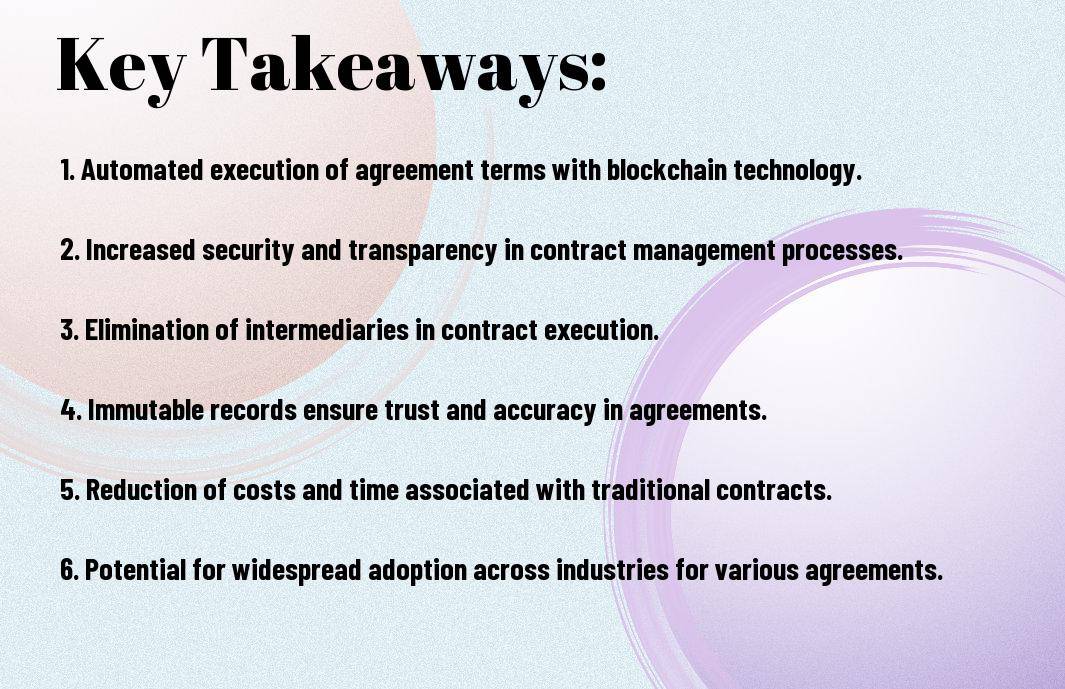Many industries are revolutionizing the way agreements are made and managed through the use of smart contracts on the blockchain. These digital contracts automate and enforce the negotiation and performance of agreements, without the need for intermediaries, drastically reducing costs, time, and potential for disputes. This transformative technology offers transparency, security, and efficiency to a wide range of sectors, from finance and real estate to supply chain management and beyond.
Key Takeaways:
- Smart contracts are self-executing contracts with the terms of the agreement directly written into code on a blockchain.
- Blockchain technology enables smart contracts to be secure, transparent, and tamper-proof due to its decentralized nature.
- Automation of smart contracts can streamline processes, eliminate intermediaries, reduce costs, and minimize the potential for human error.
- Decentralized applications (DApps) utilize smart contracts to facilitate peer-to-peer transactions without the need for a central authority.
- Smart contracts have the potential to revolutionize various industries such as finance, supply chain management, real estate, and healthcare.
- Challenges such as lack of standardization, scalability issues, security vulnerabilities, and legal recognition are hindering the widespread adoption of smart contracts.
- Ethereum is a popular blockchain platform for creating and deploying smart contracts, offering a high level of flexibility and functionality.

The Mechanisms of Smart Contracts
How Smart Contracts Work
One of the key elements of smart contracts is their self-executing nature, where the terms of the agreement between parties are directly written into code. Once the predefined conditions are met, the contract automatically executes the terms without the need for intermediaries. This automation streamlines the process and reduces the risk of errors or disputes, offering a more efficient and secure way of executing agreements.
The Role of Blockchain in Smart Contracts
An crucial component of smart contracts is the utilization of blockchain technology. Blockchain acts as a distributed ledger that securely records and verifies each transaction, ensuring transparency and immutability of the contract’s execution. By leveraging blockchain, smart contracts benefit from decentralized storage and verification, enhancing trust among parties involved.
Contracts based on blockchain technology are tamper-proof, as every transaction is cryptographically linked to the previous one, making it nearly impossible to alter the data without detection. This feature enhances the security and reliability of smart contracts, making them a preferred choice for various industries.
Coding and Customization of Smart Contracts
To create smart contracts, developers use programming languages like Solidity to code the terms and conditions of the agreement. This coding allows for precise customization of the contract, tailoring it to the specific needs of the parties involved. Smart contracts can be designed to execute a wide range of operations beyond simple financial transactions, including supply chain management, voting systems, and more.
To successfully customize smart contracts, developers need to have a deep understanding of blockchain technology and programming languages. Proven expertise is crucial in ensuring that the smart contracts will function as intended and meet the requirements of the parties involved.
Advantages of Using Smart Contracts
Transparency and Trust
The What Are Smart Contracts on the Blockchain and How Do … technology is transforming agreements by providing a level of transparency and trust never seen before. Smart contracts operate on blockchain technology, ensuring that all involved parties can access the contract and verify its terms. This transparency reduces the risk of fraud and manipulation, as every action taken on the contract is recorded and visible to everyone involved. Trust is established through the decentralized nature of blockchain, eliminating the need for intermediaries and third parties.
Speed and Efficiency
Trust in smart contracts is reinforced by the speed and efficiency with which they execute agreements. Unlike traditional contracts that rely on manual processes and intermediaries, smart contracts are self-executing and automate processes based on predefined conditions. This automation reduces the time it takes to finalize agreements, cutting out unnecessary delays and bottlenecks. The efficiency of smart contracts also minimizes the potential for errors, as the code is written to accurately carry out the terms of the agreement.
Speed and efficiency are important advantages of using smart contracts. Transactions that would typically take days or weeks can now be completed in minutes, as smart contracts streamline the process by eliminating the need for manual intervention.
Cost Reduction
On top of transparency, smart contracts offer significant cost reductions compared to traditional contract methods. The removal of intermediaries and the automation of processes mean that fewer resources are required to oversee and execute agreements. Smart contracts also reduce the risk of legal disputes, saving on legal fees and administrative costs associated with resolving conflicts. Overall, the cost-effectiveness of smart contracts makes them an attractive option for businesses looking to optimize their operations and reduce overhead expenses.
Cost reduction is a key benefit of smart contracts. By cutting out intermediaries and automating processes, businesses can significantly reduce operational costs and allocate resources more efficiently, leading to increased profitability.
Accuracy and Lower Risk of Error
Risk in traditional contracts is often associated with human error, misinterpretation of terms, and incomplete documentation. Smart contracts mitigate these risks by executing agreements based on predefined conditions and eliminating the potential for miscommunication. The accuracy of smart contracts is ensured by the code that governs their actions, leaving little room for interpretation or mistakes. This lowers the risk of errors and disputes, ultimately leading to more reliable and secure agreements.
Risk is significantly minimized when using smart contracts due to their automated nature and reliance on code to execute agreements. By removing the human element from the equation, smart contracts reduce the likelihood of errors and discrepancies that can lead to costly legal battles.

Applications of Smart Contracts in Various Industries
Finance and Banking
All financial transactions involve agreements that dictate terms of payment, interest rates, and other conditions. Smart contracts can automate these processes, ensuring that agreements are executed efficiently and transparently. They can streamline processes like loan approvals, trade settlements, and insurance claims, reducing paperwork and accelerating transactions. Blockchain technology provides a secure platform for executing these contracts, enabling parties to trust in the validity of the agreement without the need for intermediaries.
Real Estate Transactions
Real estate transactions involve complex agreements between buyers, sellers, agents, and legal representatives. Smart contracts can automate the transfer of property titles, escrow payments, and inspections based on predefined conditions. Transactions can be completed faster and with reduced risk of fraud. Blockchain technology ensures immutability and transparency in these agreements, providing a reliable record of ownership.
Moreover, smart contracts can facilitate rental agreements, lease payments, and property management tasks without the need for intermediaries, reducing costs and delays in the process.
Supply Chain Management
Real-time tracking of goods, verifying authenticity, and ensuring compliance are crucial aspects of supply chain management. Smart contracts can automate these processes by triggering actions such as payment release upon delivery confirmation or quality inspection. Blockchain technology enables secure and transparent tracking of products from manufacturer to consumer, reducing fraud and errors in the supply chain.
By implementing smart contracts in supply chain management, businesses can enhance efficiency, accountability, and trust among stakeholders in the ecosystem.
Intellectual Property and Royalties
Smart contracts can revolutionize the way intellectual property rights are managed, ensuring that creators receive fair compensation for their work. These contracts can automate royalty payments based on predefined terms, reducing disputes and enforcing copyright agreements. Blockchain technology provides a tamper-proof record of ownership, protecting intellectual property from unauthorized use or infringement.
With smart contracts, creators can have more control over their intellectual property rights and receive immediate and transparent compensation for their work.

Legal Considerations and Regulatory Environment
Not only is blockchain technology revolutionizing the way we conduct transactions, but it is also reshaping the legal landscape as we know it. Through the implementation of smart contracts, agreements are being transformed on a fundamental level. To probe deeper into how blockchain is changing legal processes, check out Transforming Legal Processes with Blockchain Technology.
Legal Status of Smart Contracts
The legal status of smart contracts is a topic of ongoing discussion among legal professionals worldwide. Smart contracts are self-executing contracts with the terms directly written into the code. While they offer efficiency and transparency, concerns arise regarding their enforceability in traditional legal systems. Courts are still navigating how to handle disputes involving smart contracts and interpreting them within existing legal frameworks.
Regulatory Challenges and Compliance
Legal and regulatory challenges are some of the primary hurdles that need to be addressed for the widespread adoption of smart contracts. Regulatory compliance is crucial to ensure that smart contracts adhere to existing laws and regulations in different jurisdictions. As blockchain technology evolves, regulators are working to create frameworks that accommodate this new way of contracting while upholding legal standards.
Smart contracts have the potential to streamline business operations, enhance security, and reduce costs, but their implementation must align with regulatory requirements to avoid legal pitfalls.
Cross-Border Legal Implications
Challenges arise when smart contracts involve parties from different jurisdictions, raising cross-border legal implications. Varying legal systems, regulations, and enforcement mechanisms can complicate the execution and enforcement of smart contracts across borders. It is crucial for parties involved in such agreements to understand the legal implications and seek legal guidance to ensure compliance with relevant laws.
To navigate the complex landscape of cross-border legal implications, parties must carefully consider the jurisdictions involved, jurisdictional rules, and potential conflicts of law.
Security Aspects of Smart Contracts
To understand the security aspects of smart contracts, it is imperative to grasp the concept of What Are Smart Contracts on Blockchain? Smart contracts are self-executing contracts with the terms of the agreement between buyer and seller being directly written into lines of code. These contracts automatically execute and enforce actions when predefined conditions are met, removing the need for intermediaries and enhancing transparency and efficiency in agreements.
Potential Security Risks
One of the main potential security risks associated with smart contracts is the code vulnerability that could lead to exploitation by malicious actors. Errors in coding, known as bugs, can result in significant financial losses or theft of assets. Additionally, the irreversible and autonomous nature of smart contracts means that once deployed on the blockchain, they cannot be easily amended or reversed, making them a target for cyber attacks.
Mitigating Security Threats
With the rising concerns surrounding security threats in smart contracts, it is crucial to implement measures to mitigate these risks. One way to enhance security is through rigorous testing and auditing of the smart contract code. By conducting thorough code reviews and testing for vulnerabilities, developers can identify and rectify issues before deployment. Additionally, utilizing secure development practices and employing standards such as the ERC-20 token standard can help in safeguarding smart contracts from potential exploits.
Security audits by third-party experts can provide an extra layer of protection, offering an unbiased assessment of the code and identifying any vulnerabilities that may have been overlooked during the development process. Continuous monitoring and security updates are also imperative to ensure that smart contracts remain robust and secure against evolving cyber threats.
Best Practices for Secure Smart Contract Development
For mitigating security risks in smart contracts, developers should adhere to best practices to ensure the integrity and reliability of the code. Implementing standard security protocols, such as multi-signature authorization for critical transactions, can add an extra layer of protection. Additionally, employing secure coding practices, like input validation and proper error handling, can help prevent common vulnerabilities such as reentrancy attacks or denial of service.

The Future of Smart Contracts
Now, as smart contracts continue to evolve and gain widespread adoption, the future of this technology looks promising. The potential for smart contracts to revolutionize the way agreements are made and executed is enormous. With continued development and integration with other cutting-edge technologies, the impact of smart contracts is set to grow exponentially.
Technological Advancements and Innovations
Advancements in blockchain technology, artificial intelligence, and the Internet of Things are driving the evolution of smart contracts. These technological developments are enhancing the capabilities of smart contracts, making them more versatile and secure. Innovations such as oracles, which provide real-world data to smart contracts, are expanding the possibilities for automation and self-execution of agreements.
Integration with Other Emerging Technologies
For smart contracts to realize their full potential, integration with other emerging technologies is crucial. The combination of smart contracts with technologies like machine learning, big data analytics, and decentralized finance can unlock new applications and efficiencies. This integration can create a seamless ecosystem where transactions are not only automated but also highly intelligent and predictive.
It is imperative for organizations to stay ahead of the curve by exploring the integration of smart contracts with these emerging technologies. By leveraging the synergies between different technological advancements, businesses can optimize their processes and unlock new revenue streams.
Potential Impact on Traditional Contract Law
Potential implications of smart contracts on traditional contract law are significant. The self-executing nature of smart contracts raises questions about legal enforceability, jurisdiction, and dispute resolution. As smart contracts become more prevalent, legal frameworks will need to adapt to accommodate this new form of digital agreement. Additionally, the transparency and immutability of blockchain technology present both opportunities and challenges for contract law.
With the potential to streamline contract processes, reduce transaction costs, and eliminate the need for intermediaries, smart contracts have the power to reshape the legal landscape. However, regulatory clarity and standardization will be imperative to ensure the widespread adoption of smart contracts while maintaining legal integrity and protecting parties involved in agreements.
Conclusion
So, smart contracts are revolutionizing the way agreements are formed and executed by leveraging blockchain technology. Their ability to automate, secure, and enforce agreements in a decentralized manner is transforming traditional contract processes. As more industries adopt smart contracts, we can expect increased efficiency, transparency, and trust in various business interactions.
Overall, the potential for smart contracts to streamline operations, reduce costs, and mitigate fraud is immense. By removing intermediaries and automating processes, smart contracts are paving the way for a more efficient and trustworthy future for agreements across different sectors. As blockchain technology continues to evolve, smart contracts will play a crucial role in reshaping how agreements are created and enforced in the digital age.
FAQ
Q: What are smart contracts?
A: Smart contracts are self-executing contracts with the terms of the agreement written into code. They automatically enforce and facilitate the performance of a contract without the need for intermediaries.
Q: How do smart contracts work on the blockchain?
A: Smart contracts run on blockchain technology, which ensures that all transactions are secure, transparent, and immutable. The decentralized nature of blockchain allows for trustless execution of smart contracts.
Q: What are the advantages of using smart contracts?
A: Smart contracts eliminate the need for intermediaries, reduce costs associated with traditional contract enforcement, increase transaction speed, enhance security and transparency, and enable automation of processes.
Q: Can smart contracts be legally binding?
A: Smart contracts can be legally binding as long as they meet the legal requirements of a contract, such as offer, acceptance, consideration, intention to create legal relations, and legal capacity of the parties involved.
Q: Are smart contracts secure?
A: Smart contracts are secure due to the cryptographic principles of blockchain technology. Once deployed on the blockchain, smart contracts are tamper-proof, transparent, and resistant to fraud and hacking.
Q: How are smart contracts being utilized today?
A: Smart contracts are being used in various industries, including finance, real estate, supply chain management, healthcare, and more. They are used for functionalities like asset tokenization, decentralized finance (DeFi), and digital identity management.
Q: What are the potential challenges of smart contracts?
A: Some challenges of smart contracts include coding errors leading to vulnerabilities, scalability issues due to the processing power required for complex contracts, regulatory uncertainties, and the need for standardization and interoperability between different blockchain platforms.



